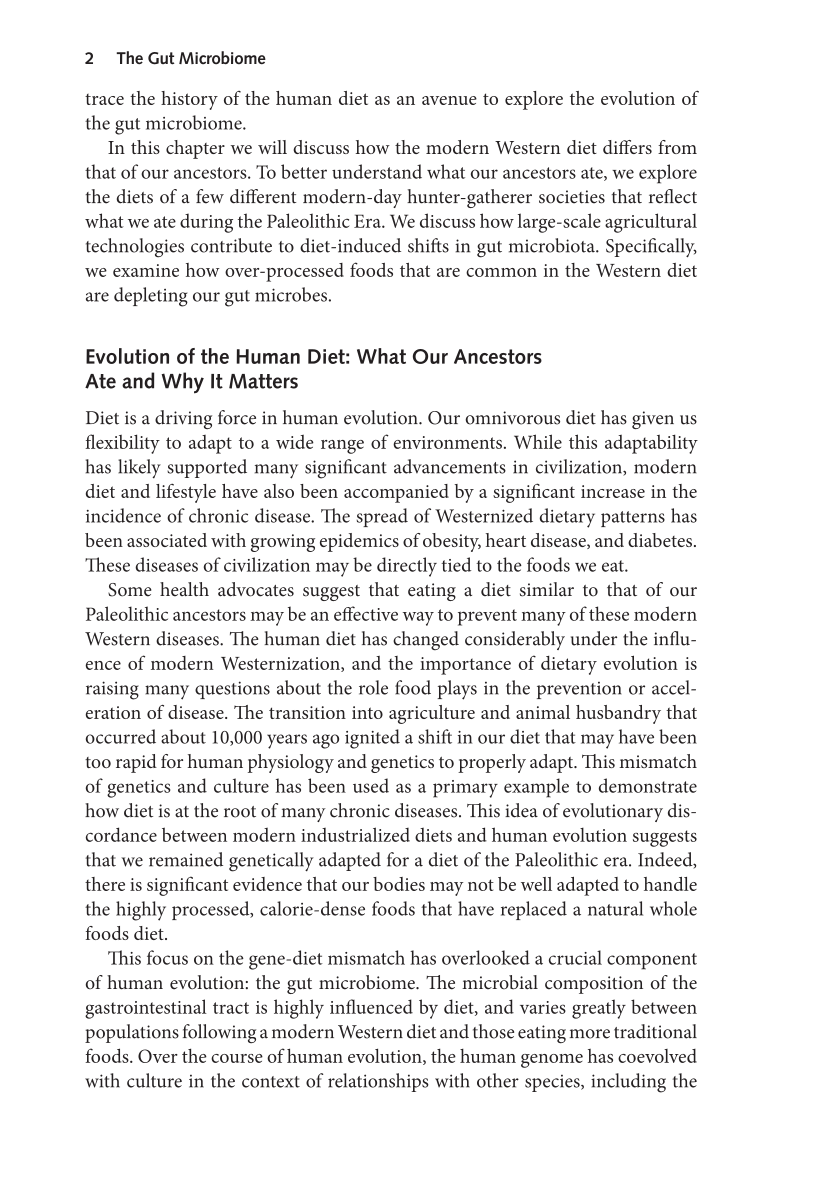2 The Gut Microbiome
trace the history of the human diet as an avenue to explore the evolution of
the gut microbiome.
In this chapter we will discuss how the modern Western diet differs from
that of our ancestors. To better understand what our ancestors ate, we explore
the diets of a few different modern-day hunter-gatherer societies that reflect
what we ate during the Paleolithic Era. We discuss how large-scale agricultural
technologies contribute to diet-induced shifts in gut microbiota. Specifically,
we examine how over-processed foods that are common in the Western diet
are depleting our gut microbes.
Evolution of the Human Diet: What Our Ancestors
Ate and Why It Matters
Diet is a driving force in human evolution. Our omnivorous diet has given us
flexibility to adapt to a wide range of environments. While this adaptability
has likely supported many significant advancements in civilization, modern
diet and lifestyle have also been accompanied by a significant increase in the
incidence of chronic disease. The spread of Westernized dietary patterns has
been associated with growing epidemics of obesity, heart disease, and diabetes.
These diseases of civilization may be directly tied to the foods we eat.
Some health advocates suggest that eating a diet similar to that of our
Paleolithic ancestors may be an effective way to prevent many of these modern
Western diseases. The human diet has changed considerably under the influ-
ence of modern Westernization, and the importance of dietary evolution is
raising many questions about the role food plays in the prevention or accel-
eration of disease. The transition into agriculture and animal husbandry that
occurred about 10,000 years ago ignited a shift in our diet that may have been
too rapid for human physiology and genetics to properly adapt. This mismatch
of genetics and culture has been used as a primary example to demonstrate
how diet is at the root of many chronic diseases. This idea of evolutionary dis-
cordance between modern industrialized diets and human evolution suggests
that we remained genetically adapted for a diet of the Paleolithic era. Indeed,
there is significant evidence that our bodies may not be well adapted to handle
the highly processed, calorie-dense foods that have replaced a natural whole
foods diet.
This focus on the gene-diet mismatch has overlooked a crucial component
of human evolution: the gut microbiome. The microbial composition of the
gastrointestinal tract is highly influenced by diet, and varies greatly between
populations following a modern Western diet and those eating more traditional
foods. Over the course of human evolution, the human genome has coevolved
with culture in the context of relationships with other species, including the
trace the history of the human diet as an avenue to explore the evolution of
the gut microbiome.
In this chapter we will discuss how the modern Western diet differs from
that of our ancestors. To better understand what our ancestors ate, we explore
the diets of a few different modern-day hunter-gatherer societies that reflect
what we ate during the Paleolithic Era. We discuss how large-scale agricultural
technologies contribute to diet-induced shifts in gut microbiota. Specifically,
we examine how over-processed foods that are common in the Western diet
are depleting our gut microbes.
Evolution of the Human Diet: What Our Ancestors
Ate and Why It Matters
Diet is a driving force in human evolution. Our omnivorous diet has given us
flexibility to adapt to a wide range of environments. While this adaptability
has likely supported many significant advancements in civilization, modern
diet and lifestyle have also been accompanied by a significant increase in the
incidence of chronic disease. The spread of Westernized dietary patterns has
been associated with growing epidemics of obesity, heart disease, and diabetes.
These diseases of civilization may be directly tied to the foods we eat.
Some health advocates suggest that eating a diet similar to that of our
Paleolithic ancestors may be an effective way to prevent many of these modern
Western diseases. The human diet has changed considerably under the influ-
ence of modern Westernization, and the importance of dietary evolution is
raising many questions about the role food plays in the prevention or accel-
eration of disease. The transition into agriculture and animal husbandry that
occurred about 10,000 years ago ignited a shift in our diet that may have been
too rapid for human physiology and genetics to properly adapt. This mismatch
of genetics and culture has been used as a primary example to demonstrate
how diet is at the root of many chronic diseases. This idea of evolutionary dis-
cordance between modern industrialized diets and human evolution suggests
that we remained genetically adapted for a diet of the Paleolithic era. Indeed,
there is significant evidence that our bodies may not be well adapted to handle
the highly processed, calorie-dense foods that have replaced a natural whole
foods diet.
This focus on the gene-diet mismatch has overlooked a crucial component
of human evolution: the gut microbiome. The microbial composition of the
gastrointestinal tract is highly influenced by diet, and varies greatly between
populations following a modern Western diet and those eating more traditional
foods. Over the course of human evolution, the human genome has coevolved
with culture in the context of relationships with other species, including the























































































































































































































